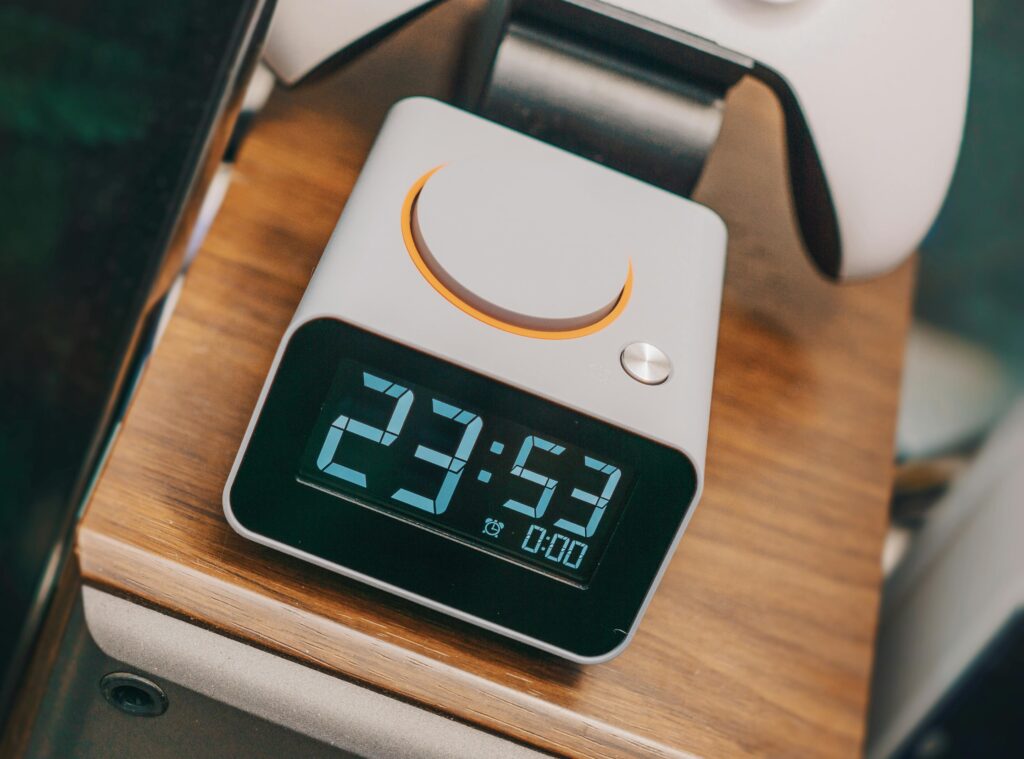The alarm clock is among those daily base objects such as towel racks of which we often take for granted, but its invention has an elongated and captivating history. Over centuries, humans of all ages have invented ingenious ways and methods to wake up at the right time, from fundamental water clocks to sophisticated mechanical devices. So, let’s take a deep look at the journey of the alarm clock and the creative people behind its invention.

The Origin of Timekeeping
Before the invention of alarm clocks the ancient civilizations have to rely on natural phenomena like the sun rising and roosters crowing to signal the start of a new day. While these were effective methods in their simplicity but they lacked precision and made it challenging to cope with strict schedules.
Sundials, water clocks, and candle clocks were among few tool the early people had for timekeeping. These devices and tools didn’t have alarm functions but flagged the way for more sophisticated and stylish inventions. The development of precise and accurate timekeeping mechanisms was very essential for designing clocks in such a way that could wake people up.
Early Alarm Clocks in Ancient Greece
The notion or idea of an alarm clock dates back to ancient Greece. The Greek engineer and inventor Ctesibius of Alexandria is commonly known for developing the earliest model of alarm mechanisms. He designed a water clock called clepsydra, which could be set to sound an alarm. This mechanism worked by using water flow to progressively raise a float, which then triggered a whistle or medal at a specific time. These clocks were ingenious but not portable so they were chiefly used in public areas or by wealthy people.

The Medieval Period and Mechanical Clocks
The more advancements were made in mechanical clocks which brought about new possibilities during medieval period. By the 14th century, some kinds of mechanical alarm clocks began to appear in European abbeys and churches. These clocks comprised of ringing apparatuses to signal specific times for prayers, meals, or work shifts. Though, they were not personal tools and didn’t allow people to set alarms for their own waking needs or tasks.

One of the major development in this era was the introduction of striking clocks. These striking clocks were rang automatically at systematic intervals. However, not exactly developed for waking people up. These striking alarm clocks laid the ground foundation for later alarm clock inventions.
The First Personal Alarm Clocks
In the early 16th century, a German clockmaker named Peter Henlein invented the first personal alarm who is known for creating portable spring-driven clocks. He developed a small timepiece with an alarm function ultimately. By this innovation a landmark transition take place from large, communal clocks to personal timepiece devices and tools.

These early alarm clocks were mechanical and required customers to set a pin or dial to the desired wake-up time by hand. In spite of their simplicity, they were innovative alarm clocks for their era and hence became largely popular among wealthy individuals who could afford them to buy.
The Industrial Revolution and Mass Production
The Industrial Revolution of the 18th and 19th centuries transformed the alarm clock from an elite good into a family necessity. The new factories and urbanization had a need for being on time; otherwise, they would not have received their wages.
An American inventor Levi Hutchins created one of the first American alarm clocks in 1787. He built an alarm clock in such a way that it had a fixed alarm set to 4 a.m. to wake him up for his work. Excitingly, Hutchins never tested or commercialized his invention because he thought that it was a personal solution for his problem rather than a product for the massive people.

In 1847, a French inventor named Antoine Redier patented the first widely available alarm clock. These clocks were prominent as they allow the users to set the alarm to a desired time and this was a feature that made these clocks practical and user-friendly.
Innovations in Alarm Clocks
The late 19th and early 20th centuries was considered as the most significant innovations regarding alarm clock designs and their technology. Some remarkable developments include:
- Electric Alarm Clocks: In the early 20th century, the creation of electric alarm clocks was started with the advent of electricity. These clocks were more accurate as they required less manual maintenance.

- Snooze Function: The snooze button was introduced in the mid-20th century. It was a beloved feature for many users. These allowed users to delay the alarm for a few extra minutes of sleep thus it was a revolutionizing step to waking-up experience.
- Radio Alarm Clocks: By the 1940s and 1950s, alarm clocks started integrating with radios. These clocks allow users to wake up to their favorite music or news programs.

Alarm Clocks in the Digital Age
With the digital revolution at the turn of the late 20th century, designs for alarm clocks evolved again. An LED display replaced an analog dial and a digital alarm clock was now standard. These featured multiple alarms, countdown timers, and variable settings.
When smartphones were first invented with the feature of having smart alarms then largely replaced traditional alarm clocks. Moreover, these smartphones latterly provide a huge variety of ring tones, scheduling options, and even sleep-tracking features for alarm setting. Still, many people use standalone alarm clocks for their simplicity and reliability.

The Legacy of Alarm Clock Inventors
The journey of the alarm clock is a testimony to human ingenuity and our need for structure and productivity. From Ctesibius’ water clock to Redier’s patented device and Hutchins’ early prototype, each invention has played its part in creating the modern alarm clock.These inventors contributed not only to timekeeping technology but also to how society approaches daily routines and punctuality.

Fun Facts About Alarm Clocks
- Roosters Aren’t the Only Natural Alarms: People used natural sounds like birdsong or the sound of flowing water as wake-up cues in some cultures.
- Guinness World Record: The loudest alarm clock, called “Sonic Bomb,” can reach around 13 decibels which is equivalent to a chainsaw surprisingly.
- Sleep Cycle Alarms: Modern alarm apps and devices are capable to track sleep cycles of users and wake them up at the optimal time within a specific gap.
Conclusion
The alarm clock, apparently simple and tiny device, has a rich history filled with innovation and creativity. The evolution of these alarm clocks have majorly impact societal changes i.e. from the agricultural age to the industrial age and to the digital era. So, now-a-days you can use either a traditional alarm clock or a smartphone alarm app to get yourself wake up. Being a satisfy customers we must take a moment to appreciate this ingenuity behind it and maybe thankful to those inventors who made waking up on time a little easier than in past ages.
FAQs
Q1. Who invented the first alarm clock?
Ans. The very first alarm clock design is often associated to Greek engineer Ctesibius of Alexandria, who created a water clock in ancient times. However, the first modern alarm clock was patented by French inventor Antoine Redier in 1847 which allow user to set specific alarm time.
Q2. What was the purpose of the first alarm clock?
Ans. Early alarm clocks were designed to wake people up at a specific time. For example, Levi Hutchins’ 1787 clock was made to wake him up at 4 a.m. for work.
Q3. How did ancient civilizations wake up before alarm clocks?
Ans. Before the discovery of alarm clocks, people had to rely on some natural wake-up cues like sunrise, crowing roosters, and sounds in their environment. While monasteries often used bells or striking clocks to signal prayer times or work shifts.
